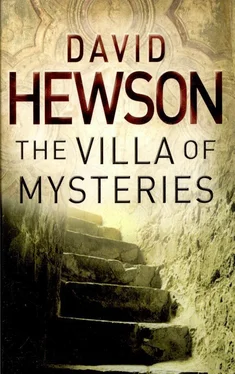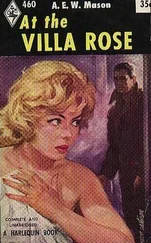There were bigger things to worry about. Teresa, for one thing. Where she’d gone, feeling so mad he didn’t even dare question her wisdom. Why she was poking her nose into police work. Again. And, most of all, why she never noticed the way he felt.
“DO YOU KNOW what month this is?” Vergil Wallis asked. “The month of Mars. Do you know what that means?”
They sat in the main room of the fortified villa on the Janiculum Hill. The place was odd: half oriental, half classical Roman. There were statues from imperial times, copies maybe, next to delicate porcelain vases covered in Japanese designs: chrysanthemums and country scenes sparsely populated with stick figures. A slight, pretty, oriental girl in a long white smock served tea. Wallis scarcely noticed her presence.
In a brief conversation as they walked to the villa Rachele D’Amato had told them the man was long gone from the mob and now spent most of his time in Italy or Japan, source of his twin obsessions. In retirement he was a history freak: imperial Rome and the Edo period. Wallis looked about fifty, a good ten years younger than his true age. He was tall, fit and strong. His dark hair was cropped short. He possessed an alert, fine-featured face dominated by large, intelligent eyes which were constantly active. Without the benefit of D’Amato’s briefing, Costa would have said he had the dignified bearing of an intellectual or an artist. There was just one outward sign of his past that she’d warned him about. Before coming to Rome as an emissary for his bosses, Wallis had lived in Tokyo for several years, liaising with the Sumiyoshi-gumi , one of the three big Japanese yakuza families. Somewhere along the way the little finger of his left hand had gone missing in some kind of brotherhood ritual with the Japanese mob. Unlike most ex-yakuza gangsters, he didn’t try to disguise the loss with a prosthetic. Maybe Wallis seemed to think himself above that kind of trick. Or past it, if they were to believe Rachele D’Amato. It occurred to Costa, too, that this act was in itself a ritual, one of belonging, in this case brotherhood. If Teresa Lupo was right, something similar had claimed the life of his stepdaughter.
“War,” Costa said. “Mars is the god of war.”
Wallis beckoned to the girl for more green tea. “Right. But he was much more than that. Indulge me. This is how I amuse myself these days, for half the year anyway, when I’m here.” His Italian was near perfect. If Nic Costa closed his eyes he could have convinced himself he was in the presence of a native. Wallis’s soft, intelligent tones sounded like those of a university professor. “Mars was the father of Romulus and Remus. In a sense he was the very father of Rome. They worshipped him more for that than his warlike aspect. The month of Mars was about the health of the state, which for Romans meant the health of the world. It was about rebirth and renewal through the exercise of power and force.”
“And sacrifice?” Costa asked.
Wallis looked around him, considering his answer. “Maybe. Who knows what you would have seen on this spot two thousand years ago?” He scanned their baffled faces. “You don’t know? Really. I thought the DIA knew everything. I built this villa from scratch ten years ago, on the site of an old temple. It filled my time. I have plenty to fill. Some of the pieces you see here came out of the ground. You won’t tell the Soprintendenza Archeological, will you? I’ve left them to the city in my will. It won’t harm anyone if they spend a little time with me, surely? You’ve got plenty else besides.”
“We’re not here about statues,” Rachele D’Amato said.
Wallis stared at her and there was a note of icy disdain in his dark eyes. “Listen to the Roman talking. You grow up in a place like this and walk around with your eyes closed. Still, people change. It was easier to handle the planning people a decade ago than it would be now. They were more… pliable. I would never have done this today, of course. They’re different. So am I.” He waited. “Signora. You’re from the DIA. We’ve met before, of course. Twice is it? Three times?”
“Twice I believe.”
“Quite. I was generous with my time then. I don’t feel that way anymore. This doesn’t require your presence. You know as well as anyone that I retired not long after my stepdaughter disappeared. You’ve no cause to be here now. I can understand why, in the present circumstances, the police have to call. But I’ve got nothing to say to you.”
Peroni caught Costa’s eye, winked and held up a sly thumb.
“I know all this—” she said, taken aback by his frankness.
He interrupted her. “Then why are you here?”
“Because of who you were.”
“Were,” he repeated. “I try to take this lightly but you must understand. These are recollections of a double loss for me.”
“A double loss?” she asked.
“My wife died in New York not long after Eleanor disappeared.”
The memory broke her confidence. “I forgot,” D’Amato stuttered. “I apologize.”
“You forgot?” He seemed more perplexed than offended. “A detail like that?”
She was struggling to come up with something to keep this conversation alive.
“What happened?” Costa asked, trying to help.
“Ask her.” He nodded. “Like I said. They’re supposed to know everything.”
“I don’t recall,” she murmured.
“No?” There was a brief hint of ironic victory on Wallis’s handsome face. It gave Nic Costa pause for thought: something dark still lurked inside this man. “Read the files. My wife and I separated a year before this happened. I rented an apartment for her on the fiftieth floor of a block near Rockefeller Center. Shortly after Eleanor went missing she stepped off the balcony.”
The three men looked at each other. Costa knew what each of them was thinking: it was impossible to work out precisely how Wallis felt about this event.
“I’m sorry. Nevertheless,” D’Amato persisted, “the protocols demand that the DIA are present if the police interview someone with your kind of record.”
Wallis smiled wanly. “What record? No one’s ever prosecuted me for a thing. I’ve never confessed to any crime. Perhaps I have never committed any crime.”
“Then I apologize but it’s how it must be.”
Wallis shrugged. “The Italian love of bureaucracy is one of the few things about this country I fail to understand. I don’t wish to offend, Signora, but I will repeat myself: you are out of line. I don’t see how I can refuse to speak to the police in these circumstances. You are different.” He pointed to the double doors that led outside to the patio. “This is nothing personal. You must go. If you don’t, I talk to no one. Please…”
“I…” she stuttered, looking at Falcone for support. The inspector shrugged his shoulders. Peroni uttered a low chuckle.
“This is wholly improper,” she hissed, rising from her seat. “We…” she glared at Falcone, “… will talk outside.”
Wallis smiled and watched her walk brusquely out the door. “There’s a Japanese saying: ”Yesterday’s enemy is today’s friend.“ Not always. A shame. She’s a charming woman.”
“First time I heard her called that,” Peroni grumbled.
Wallis looked at him, just a hint of reproach in his eyes. “You think you’ve found my stepdaughter. Are you sure?”
“We’re sure,” Falcone said.
“So why the hell has it taken this long for you to tell me? It’s two weeks since that body turned up.”
Falcone was off his guard. “You knew we had a body?”
“Give me credit,” Wallis said pleasantly. “Eleanor may not have been mine but I loved her anyway. She was a great kid. Bright, charming, interested. I loved her mother too, not that it was easy. I blame myself for most of that. But Eleanor…”
Читать дальше












